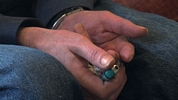Our 14 year old golden retriever, Rudy, died today. My wife, Pam, and I are grief stricken. Rudy was with us for more than half our married life. He was our hiking partner, our companion every day, our friend.
Thankfully, we have each other in our grief. And, we have had many grieving experiences together already. We've had some practice in how to do it.
Here's some of what we've learned over the years about sharing grief together. Telling you about it will help me to begin the path for my own grief over Rudy.
1. Grief is a normal reaction to loss. It is a way we process emotionally, intellectually, and spiritually when something or someone important to us is lost in some way.
While grief has all the classic stages of denial, anger or depression, the overall feeling is the ache of sadness. It's normal. It's expected. It can even bring growth when we welcome it.
2. Each person has different needs and styles of grief. Some need to talk it through. Some need a lot of internal mulling. Some need to cry. Some need rituals.
Pam needs to sit and think, and then talk with me, often over and over. I need a lot of internal time to let it sink in and get past my normal emotional reserve. But I need to know that Pam is there ready to hear my thoughts and feelings as they make their way out of me.
It has been very important in our relationship to honor these different needs in each other. It hasn't always been easy. Earlier in our life together we could mistakenly expect the other to do things our own way. That was usually experienced by the other as hurtful and non-accepting.
Sometimes, we shift roles. Today it was my turn for many tears. It was her turn to draw me out and listen. Usually it is the other way around. It doesn't hurt to be flexible about all this stuff.
3. It's NOT about being rational. It's about being effected in an emotional way. It matters to us that we lost something or someone. We have some passion about it. It touches us deeply. It is not to be explained away.
The intellect comes into play, but we have to be careful.It is far too easy to retreat into the emotionless parts of the intellect and deny the pain. It's easy to talk about the pain, rather than let ourselves experience and work through it.
The reason I have pain over Rudy is because he really, really mattered to me. My pain is a respectful response to the loss of a faithful companion. It hurts because such things should hurt.
4. Grieving together is invitational, not pushy. We can't make someone grieve. We only invite the other to enter the process with us. We ask if they have some feelings to share, or if they're open to hearing ours.
Judgement is not welcome. One's pain is just what it is: pain. It doesn't have to make sense, just felt and eventually released.
5. There is no prescription for the "right" amount of sadness or the "correct" type of feelings to have. We have each experienced very different levels of grief in different losses. Losing my father earlier in life was much more traumatic than when my mother passed many years later after a long life. Losing my way vocationally for a time was a dull ache that persisted for several years.
Because we are different people we will grieve differently. Expecting a partner to experience it in a certain way is a recipe for disappointment and defensiveness.
6. Telling stories helps a lot. Human beings have used stories for thousands of years to help communicate and process what is happening to them.
Pam and I tell each other the stories we remember. We include both the good and not so good experiences. It doesn't matter if we've told the stories before. In this case, we have many good stories about Rudy and very few bad ones.
7. Rituals can help tremendously. I do not mean only formal rituals. They can be a great help, but more informal ones can be just as valuable.
For example, we've tried a special meal on a day of remembrance, a piece of music played now and again, or a place set at the holiday table representing one who once sat there. When our last dog died we had steak for breakfast the next day in his honor. We knew he would approve. All these little remembrances help us release a little more grief over time.
So, what will be the path of our grief over Rudy? We have already cried and spoke at length today. More will come of that. There are the pictures to look at from the past 14 years. Comforting our other dog who now misses her partner will comfort us, as well.
Pam will know I feel it when I look at the empty floor at my bedside. And, I will know to ask her about her feelings as we consider the timing of bringing a new puppy into the house. For us, the timing will not be right until much of the initial grief is experienced and resolved.
There will probably be a new ritual in our lives that has yet to be created. Improvising new ways of celebrating life has always been Pam's gift.
And so, I will readily accept whatever shape this grief will take. Rudy will be remembered well one way or another, and the journey of our marriage will benefit from it. Together we say a good "Good-bye" to Rudy, so that we can say a very good "Hello" to what comes next.



